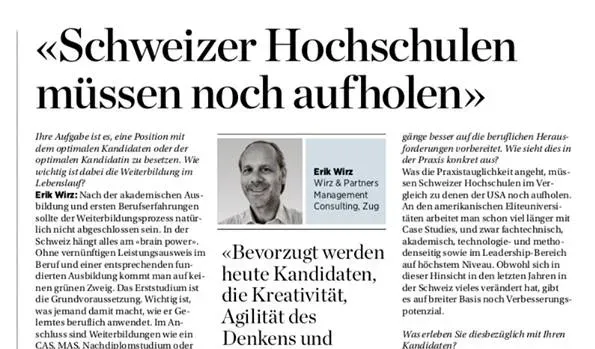
HZ Handelszeitung, Continuing education as a career booster after graduation?
"Today, candidates who demonstrate creativity, agile thinking and interdisciplinary problem solving are preferred."
Erik Wirz, Wirz & Partners Management Consulting. Zug
Your job is to fill a position with the best candidate. How important is continuing education in a candidate's CV?
Erik Wirz: Obviously, after an academic education and initial work experience, the process of continuing education should not end. In Switzerland, everything depends on "brainpower". You won't get very far without good professional experience and a solid education.
The first degree is a prerequisite. What's important is what you do with it, how you apply what you've learned professionally. After that, further education such as a Certificate of Advanced Studies (CAS), Master of Advanced Studies (MAS), postgraduate studies or a Ph.D., or a combination of these, can be useful.
What do you think of continuing education programmes such as Certificate of Advanced Studies (CAS), Diploma of Advanced Studies (DAS) and Master of Advanced Studies (MAS), which are now offered by many universities of applied sciences?
The key is always relevance to the position or role in the current job. Continuing education programmes that are not related to one's CV and current duties and responsibilities are nice, but have little positive impact on career development. For example, someone who studied pharmacy and then takes a CAS in digitalisation cannot be expected to become the head of IT. It's different if the same person, after studying pharmacy, works in industry, gets involved in an IT project and spends several years at the intersection of business and technology. If the person then progresses within the company and then takes the relevant IT training, a further education course such as a CAS can be a useful lever.
So work experience is also very important.
Yes, for senior positions our clients expect a track record, both in terms of leadership and in terms of technical and academic skills. Technical training alone is not enough.
According to a study, graduates of such training programmes feel better prepared for professional challenges. What does this mean in practice?
In practical terms, Swiss universities have some catching up to do compared to their US counterparts. The elite American universities have been working with case studies for much longer, both technically, scientifically, technologically, methodologically and in leadership at the highest level. Although a lot has changed in Switzerland in recent years, there is still room for improvement across the board.
What is your experience with candidates in this regard?
In the technology and life sciences sectors in which we operate, we have high standards. In their studies, people learn to gather, process and apply information quickly and under pressure. We like to talk about an intellectual toolbox that everyone carries with them. We don't just learn from books; we look at best practice, learn from our colleagues, gather information from the internet and learn on the job every day. So the biggest challenge for people going through the training programmes described is this:
They must be able to apply what they have learnt, even in exceptional situations, and come up with creative solutions. Candidates who demonstrate creativity, agile thinking and interdisciplinary problem solving are preferred today.
In addition, graduates say that continuing education has a positive impact on higher earnings. Is this in line with your practical experience?
It depends. If a person with a degree in business administration from the HSG adds an MBA and thinks he can quickly recoup the investment by earning 30 to 50 percent more immediately, this assumption is not realistic. It's different when someone, after several successful years in a position, completes an MAS or DAS and gets promoted and receives a higher salary accordingly. We often see this pattern.
